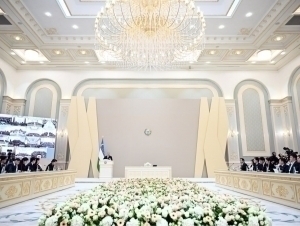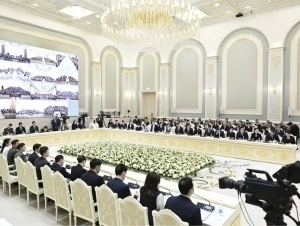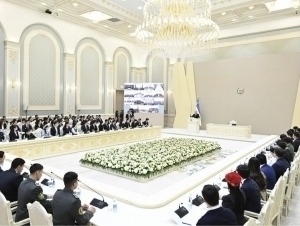Kochkarov's wedding, surviving Allamjonov, non-deputy Nazarbekov - analysis of the week
Review
−
02 November 2024 18548 3 minutes
This week’s analysis captures three prominent events that reveal the complex dynamics of power, privilege, and public scrutiny in Uzbekistan.
Kochkarov's Lavish Wedding: An Examination of Extravagance Amid Regulations
Jamshid Kochkarov, the Minister of Economy and Finance, hosted a grand wedding for his daughter, a luxury display that contradicted recent government efforts to curb ostentatious celebrations. Despite policies set by the Legislative Chamber and the Senate to limit opulent gatherings, officials, including Kochkarov, continue to flout these restrictions. The event ignited debates on social media, highlighting the divide between the government’s public stance on economic modesty and private displays of wealth among officials. The government’s inconsistency in enforcing these rules reflects a deep-seated issue of accountability and the widening gap between leadership and citizen expectations.
The Allamjonov Incident and the Mysterious 'Situation in Kibrai'
The attempted assassination of Komil Allamjonov, a former official in the Presidential Administration, caused a media frenzy, raising serious questions about transparency and media freedom. The General Prosecutor’s Office reported arrests about the incident, labeling it the "Situation in Kibrai" without explicitly mentioning Allamjonov’s name. This evasive language and the lack of official statements have led to speculative reporting and the spread of unverified information, emphasizing the challenge journalists face in navigating an information landscape where access to facts is limited. The Allamjonov incident not only reflects a murky political environment but also highlights the media’s struggle to deliver accurate reporting in a country where openness is constrained.
Nazarbekov's Political Aspirations and the Failure of Ministers to Secure Legislative Seats
In the recent elections, several high-profile ministers, including the Minister of Culture Ozodbek Nazarbekov, failed to secure seats in the Legislative Chamber, casting doubt on the political landscape's inclusivity. The results reflect an electoral environment that, while technically prepared, lacks real competition, as noted by international observers such as the OSCE and the EU. They criticized the restricted political space, which led to a lack of opposition presence and limited choices for voters. Nazarbekov’s potential senatorial aspirations and the speculation surrounding a new ministerial appointment underscore the fluidity and strategic maneuvering among political elites.
Gender and Governance: The Case of Dilfuza Orolova
An audio recording of Dilfuza Orolova, the female mayor of Boyovut district, allegedly assaulting and insulting a farmer has sparked a broader conversation on the behavior and ethics of government officials. The Ethics Commission of the Sirdarya regional administration addressed the incident but stopped short of dismissal, signaling leniency that activists argue contributes to a culture of impunity. As Uzbekistan seeks to improve gender representation in leadership, cases like Orolova’s reveal the complexities of governance reform and public accountability.
In summary, these incidents collectively reveal an Uzbekistan grappling with issues of transparency, elite privilege, and accountability. While public outrage and international criticism highlight the need for reform, the government’s actions—or lack thereof—suggest a challenging path forward.
Live
All



